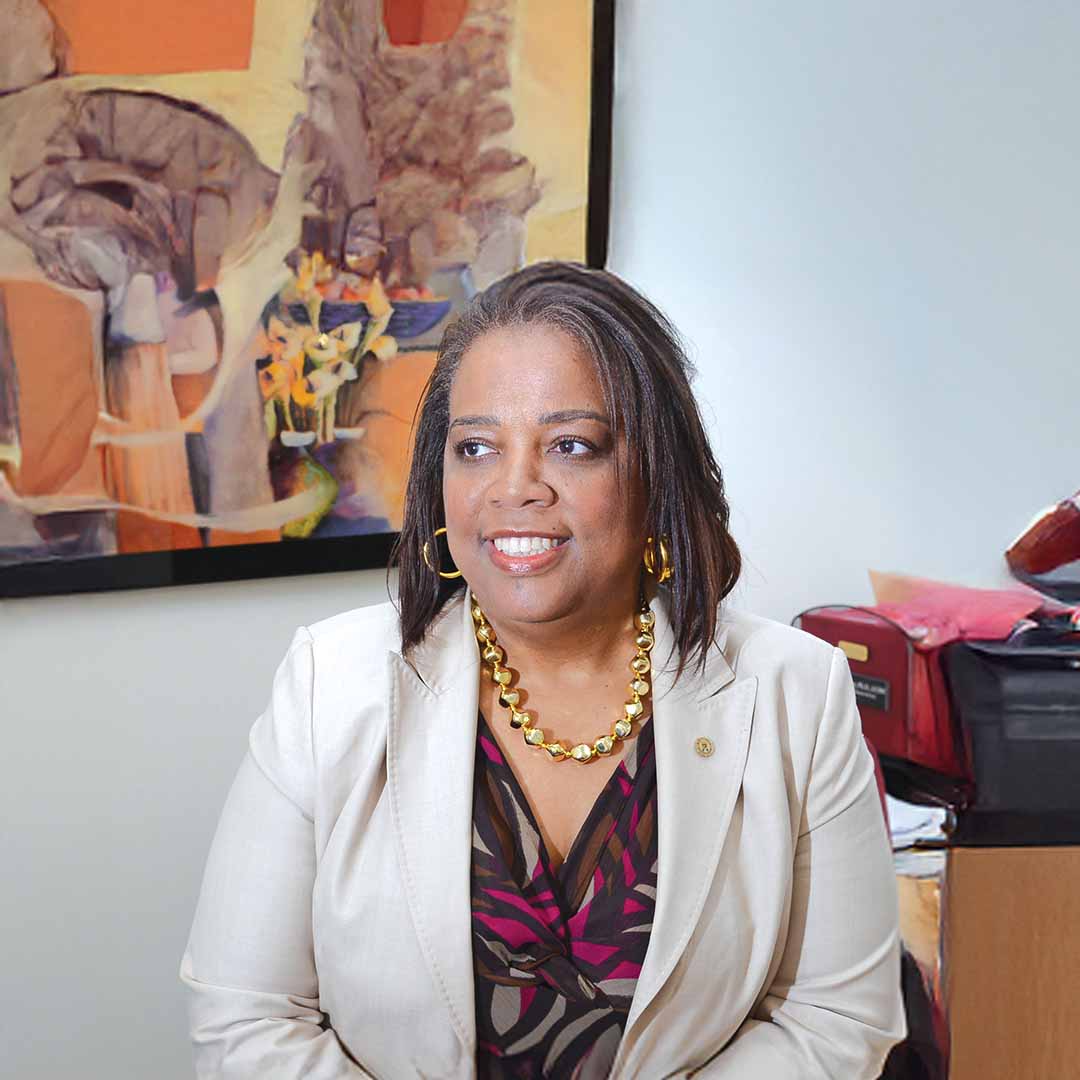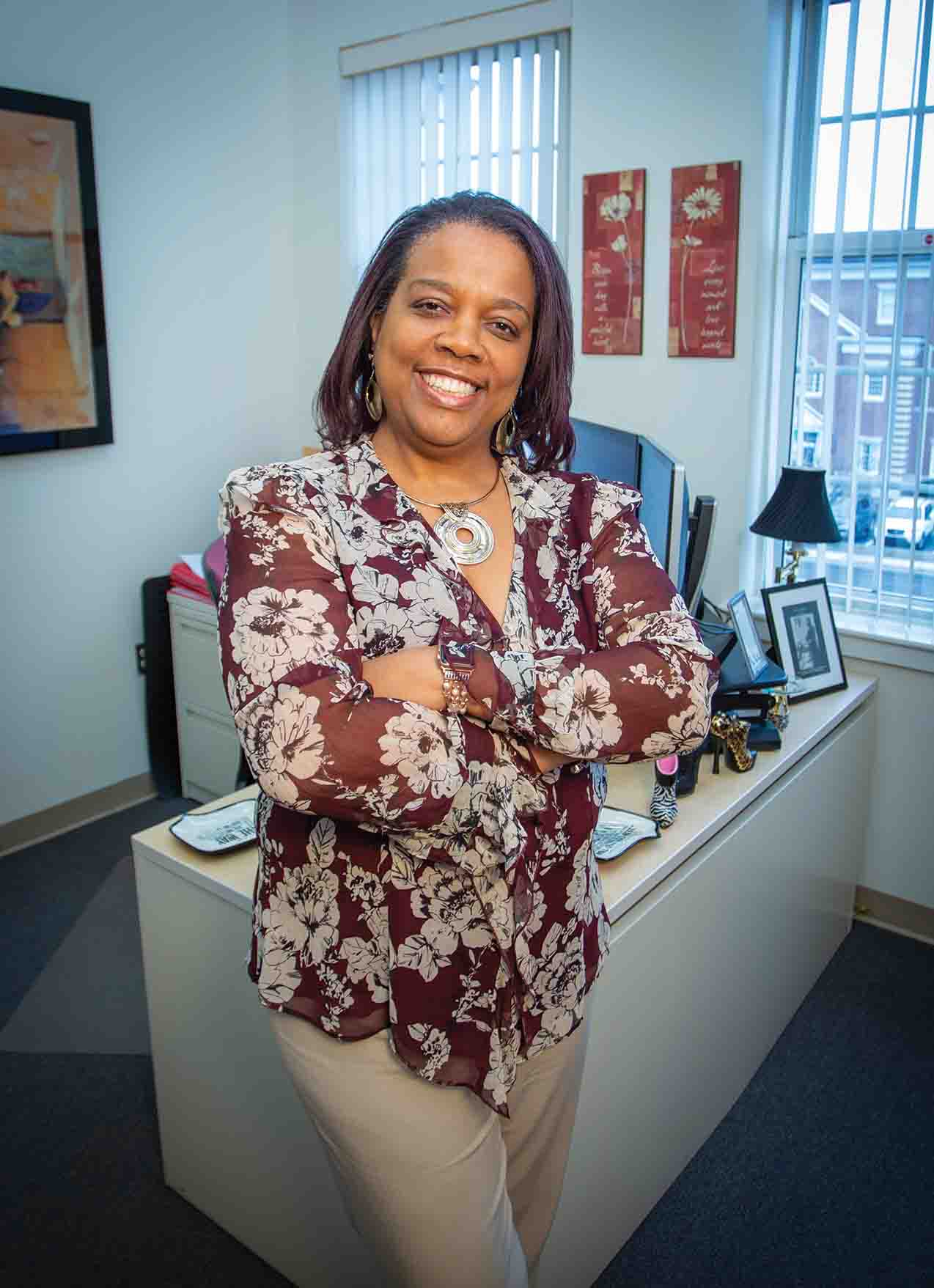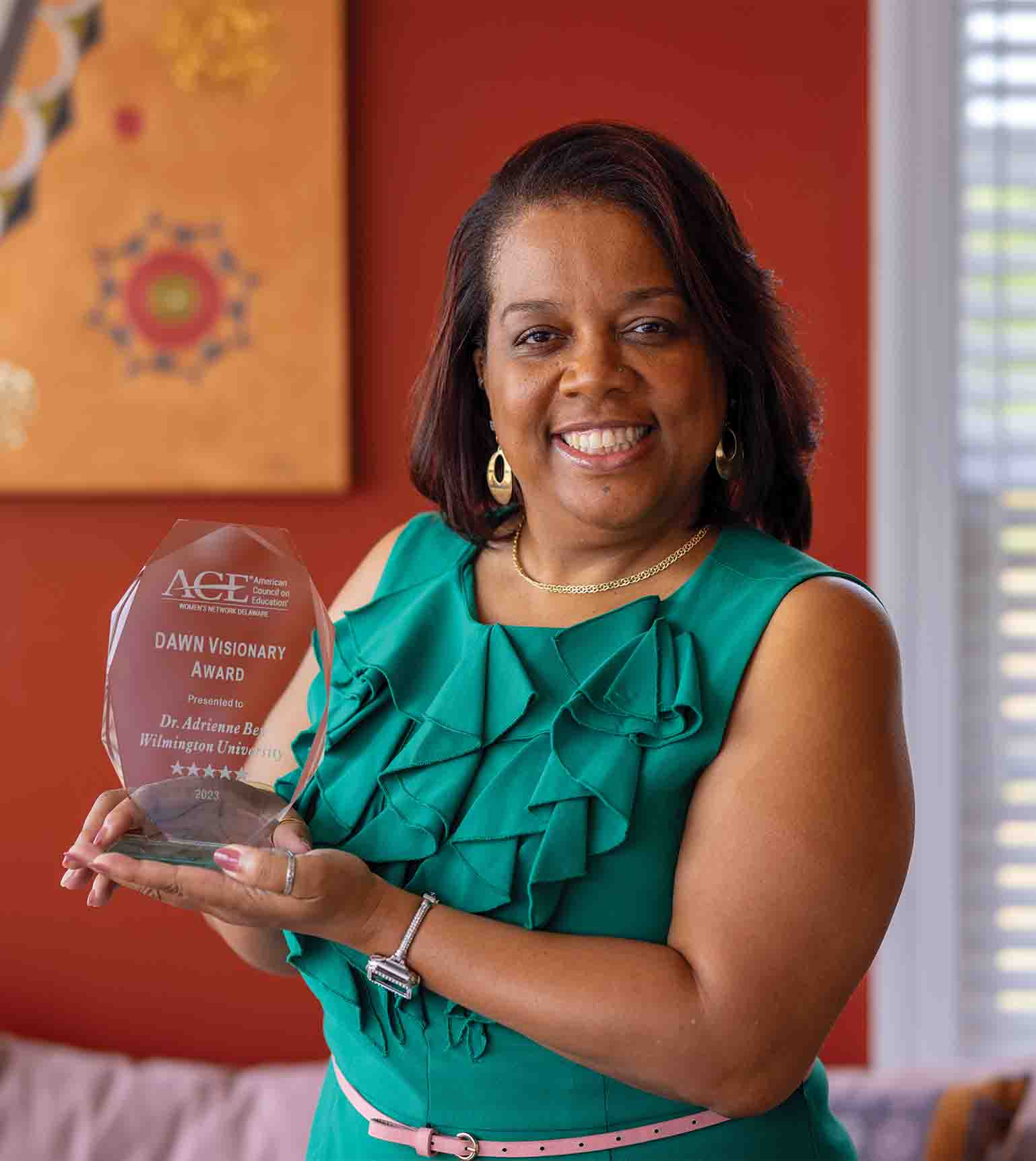A New Dean: Dr. Adrienne Bey

Soon after she was appointed dean of the College of Social and Behavioral Sciences (COSBS) last April, Dr. Adrienne Bey shared what she called “my story” in her first staff meeting with her COSBS colleagues.
“I have always had a passion for helping people,” she began. “It’s interesting how my journey and all of my experiences have led me to where I am now. “
Indeed, Dr. Bey’s CV is a testament to her qualifications for the job. Her career, as she said in that initial meeting, had touched on virtually everything “being taught in the college — from corrections/criminal justice, prevention/intervention/or treatment, to human services administration and clinical mental health counseling.”
As for legal studies, she pointed out that one of her daughters had graduated from Howard University School of Law and is a law clerk in Washington for a contractor with the U.S. Department of Justice (DOJ), while her other daughter, who has an M.S. in Administration of Human Services from WilmU and was an Audrey K. Doberstein Leadership Award recipient, is DEI administrator for the Delaware DOJ.
She ended the meeting with a light-hearted cautionary note: “One thing about me is that if you spend enough time with me, I will start treating you like family. Some people embrace this and some people may not be comfortable with it. I get it. Please call me out if I get too comfortable.”
While her title has the ring of inevitability about it, Dr. Bey says the path her career took wasn’t the result of “a specific plan.”
“Opportunities arose,” she says, “and I went ahead and took advantage of those opportunities.”
“Bloom where you’re planted,” she adds.
There were hints early on that she had an aptitude for connecting with people. At William Penn High School in New Castle, she was voted the senior class superlative “most talkative,” a designation that surprised her a bit.
“I mean, there were about 400 people in my class,” she laughs. “I thought it was funny. Looking back at it now, I guess I’ve had it all my life — the gift of gab.”
She played varsity basketball and was a student council officer. She also had perfect attendance throughout high school, a sure sign that she enjoyed being around people, especially her classmates. “I was very high on work hard, play hard,” she says. “I am an only child, and that was my peer group, my community.”
In choosing a possible career, Dr. Bey says she felt a calling “to work with children and families, especially children,” and she considered becom-ing a child psychiatrist, but she wasn’t keen on committing to four years of medical school. So she enrolled as a Psychology major at Temple University. She spent two years there, then transferred to the more affordable University of Delaware for her last two years, graduating in 1990.
Since then, her career has confirmed that she does indeed have “a passion for helping people.”
Dr. Bey spent many years in human services and mental health counseling, mostly working with vulnerable populations. She started as a mental health associate at MeadowWood Behavioral Health Hospital in New Castle, then moved on to Child Protective Services for the State of Delaware, working the second shift and handling emergency situations alongside the New Castle County Police.

Her next job, as a juvenile probation officer and Operation Safe Streets officer, proved frustrating, but it did inspire her to get a master’s degree and, ultimately, her Ph.D.
“We would often send kids out to the Midwest to be ‘rehabilitated,’ but I ended up bringing them back to the same environments,” she says. “It was a vicious cycle. I finally got frustrated with the system, and I decided that I needed to get an advanced degree to see if I could impact kids from a policy perspective.” So she enrolled in the master’s in Social Work program at Delaware State University (DSU).
While there, she secured internships with two area prisons. At Howard R. Young Correctional Institution, or Gander Hill Prison, she worked through a grant that was written by one of her DSU professors to offer parenting classes to fathers convicted of felony-level offenses against children. At Baylor Women’s Correctional Institution, she assisted the prison psychologist with “psych exams and facilitating women’s psycho-
educational life-skills groups.”
Two of her professors were so impressed with her work that they urged her to pursue a Ph.D. “I had never thought about it before,” Dr. Bey says, “but with their support, I did it.”
First, though, she had a couple of graduations to attend — her own, and her mother’s.
Dr. Bey was the first member of her family to earn a college degree, and in 1999, her mother, Sandy Clark, became the second. After working in banking and then children’s services for many years, her mother decided to earn a B.A. in Human Services from Springfield College. She took classes at what was then the school’s satellite campus in downtown Wilmington, but graduation was in Springfield, Massachusetts — on the same day her daughter was to receive a master’s degree from DSU.
Dr. Bey decided to skip the Dover ceremony and instead traveled to Springfield, where she sat in the audience in her cap and gown with her father and family to proudly watch her 52-year-old mother receive her degree.
That fall, Dr. Bey went back to UD to study for a Ph.D. in Human Development & Family Sciences. While working on the degree and raising two daughters with Randy, her husband of 31 years, she took on a number of social services jobs. Among them was working as the coordinator for the federal Weed & Seed Initiative through the Ministry of Caring (in partnership with the District of Delaware’s U.S. Attorney’s Office and the Delaware Criminal Justice Council), and voluntary training of lay counselors at her church (she has a diploma in Biblical Counseling). It was through the latter sessions that she connected with Wilmington University.
“Someone at one of my workshops knew about an adjunct who needed someone to replace her for one class in the school counseling program in the College of Education,” she says. “They referred me, and I taught that one class and then I was hired as an adjunct for additional courses.”
That was 2004, and it marked the beginning of what became a steady climb up the University’s academic ladder.

Two years later, she saw a story in The Wilmington News Journal that piqued her interest. It was about a new Administration of Human Services master’s program in the College of Social & Behavioral Sciences at WilmU that was being spearheaded by Dr. Lori Sitler, then an assistant professor and chair of the University’s Government and Public Policy program. Through her stint as a parent educator at CHILD, Inc., Dr. Bey had met Dr. Sitler, who left the University in 2018 to become executive director of CHILD, Inc.
“I contacted Lori and let her know that I was available if she needed any help, and I was hired on a contractual basis to create the internship handbook,” says Dr. Bey. That assignment led to an assistant professorship and appointment as the first chair of the AHS master’s program. She filled that position for 111/2 years, until 2018, when she was named director of the Center for Teaching Excellence (CTE).
Dr. Bey brought her usual enthusiasm and creativity to the CTE job. “For seven years,” she says, “I had the opportunity to guide professional development opportunities for all faculty, both full-time and adjunct, based on current trends. Recognizing that students bring their full identities to the classroom, we focused on equipping faculty with the skills to create inclusive classroom environ-ments that meet diverse student needs. We covered a wide array of topics, from theory to practice — Artificial Intelligence, Neurodiversity in the Classroom, Faculty Wellness, etc. No training topic was off limits. We also created a pathway for faculty to earn the designation of Change Champion. I was also responsible for facilitating the monthly Chairs Roundtable meetings, and I onboarded new academic chairs. Through CTE, we created an onboarding process that includes monthly peer group meetings and the assignment of a mentor for each chair. The goal is to help chairs get acclimated to the University and its mission, as well as provide support in understanding their job duties for their new role.”
While serving as CTE director, Dr. Bey earned a full professorship in 2019 and was recognized as a 2023 Delaware American Council on Education Women’s Network Visionary.
She settled quickly into her new job as COSBS dean, meeting one-on-one with the directors, chairs, and staff. She says she wanted to see “what their vision was” for the college, adding that she foresees opportunities in their curriculum and other areas.
“I have ideas about what we can do to position ourselves in 2025 and beyond,” she says. “The disciplines taught in our college are ripe for innovation.”
In the meantime, she continues with her private consulting business — ABS Empowerment Group. ABS (an acronym formed from the first letter of her name and the names of her children, Brandi and Sabrina) provides counseling services as well as clinical supervision and mental health technical assistance, nonprofit program development and strategic planning services (including faith-based), motivational seminars, and parent education workshops.
To fulfill these roles, she says, “I have various certifications and a clinical license that I have to keep current, which includes being a Licensed Clinical Social Worker and a Human Resources Senior Certified Professional. My consulting business provides me the opportunity to keep abreast of current trends in those fields for my license and certification renewals.”
In her spare time, Dr. Bey spends time with her grandsons, Clark and Adonis, attends meetings of the WilmU Toastmasters Club (which she founded 10 years ago), plays bingo, and attends soul line dancing classes.
“I do it for exercise,” she says. “People invite members of my line dance class to parties to teach line dancing. We get the party started.”
The group, she says, “is mostly retired people. I appreciate spending time with people aging in a vital way, living their lives to the fullest.”
Then she adds, “I love people. I get energy from people.”
— Bob Yearick
Want to read more in-depth stories? Explore our latest magazine articles.



